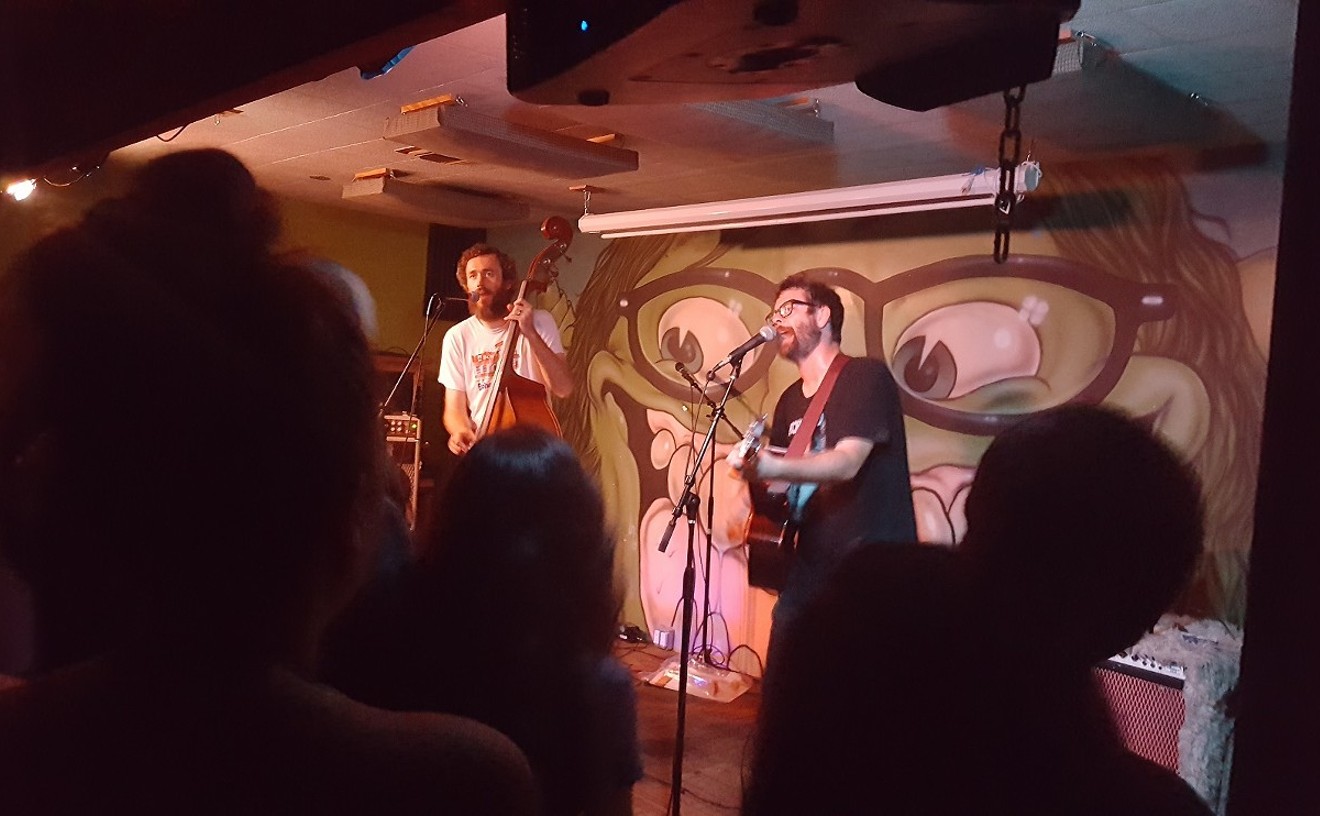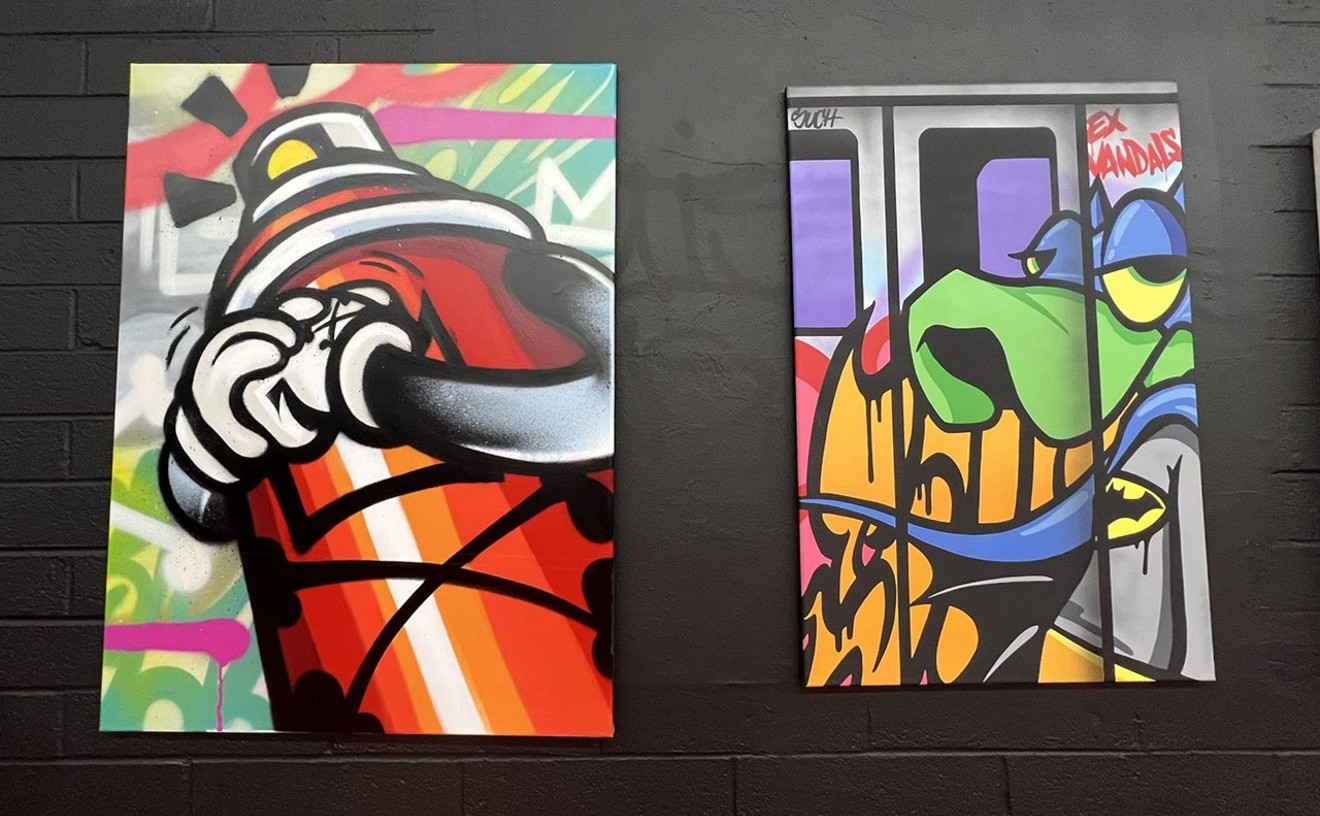What is it that makes us different from one another? How do we define ourselves in relation to others? These expansive questions are probed by the 22 artists participating in "Equal Parts," currently on view at Frontal Lobe Community Space and Gallery. Co-curated by Amanda Adkins and Ashley Macias, the exhibition explores identity through a fairly broad scope. This inclusiveness is refreshing, but while we feel like many works fully engage with the dialogic threads of the exhibition, others simply glaze over the inherent politicality of identity.
See also: Postcommodity Retools Mechanisms of Western Culture to Critique Itself at SMoCA
Some works respond to what makes each of us different with the notion that we are all, essentially, the same. Yai's Just The Same, a playfully graphic painting that pairs shape and color with two identical nebulous figures, proposes this sense of sameness. While that's true in some ways, ignoring what sets us apart minimizes the complexities of race, class, gender, and sexuality.
Sameness is a collective kumbaya that has been a dominant social dialogue and, to put it frankly, it needs to stop. We've learned time and time again that "equality" doesn't look like what it should or could be. Even with strides forward over the course of several decades, inequality is still systemic: people of color are criminalized, transgender people are medicalized, and women are minimized and objectified.
The curators of "Equal Parts" invited artists to submit work that had to do with identity and self-definition, whether it be political or not. Jessica Kerlin and Katharine Leigh Simpson are two artists in this exhibition that engage with this notion of identity in a more personal way, one that isn't as concerned with the politics of identity. Their works, along with others throughout the exhibition, seek to define the essence of the inner self. The highlights of this exhibition, however, are those works that create a sense of discomfort and dissonance with dominant modes of being.
There is a strong presence of work made by women that addresses the problems of femininity as social construct and the objectification of women. Fixation: Eye and Fixation: Lip by Megan Koth utilize a pop aesthetic, a style of painting that was once dominated by men, to confront the everyday rituals of femininity. Koth centers these parts of the body as a site of prescribed gender performance, emphasizing how women are expected to participate in order to be recognized as feminine.
Welding Dress, a video installation by Therese Grossmeyer and Sean Deckert, also addresses the notion of gender performance. Grossmeyer, wearing a polka dot dress, is in the video welding and using a chop saw. Grossmeyer's passion is to work in the shop, but she also likes to dress up, wear makeup, and, like every person, has to do laundry. She and Deckert are focused on revealing how fluid and arbitrary gender roles are.
Another video installation on display in "Equal Parts," Shades of Her by Sam Angiulo, pulls from erotic novel Fifty Shades of Grey and Internet pornography. Sitting in front of the computer with headphones in, we are immersed in muddled voices reciting passages from the novel, along with a repeating image from a pornographic video.
Angiulo's installation plays with the boundary between pleasure and pain. Fifty Shades of Grey is a book that has become popular among women, though it's a highly problematic story. In the story, a woman places herself in an abusive, one-sided relationship that positions her as only an object of conquest and desire. The still image repeating in the video could either be of ecstasy or pain. Angiulo is addressing how these two erotic sources that represent women force them into a submissive role, one that positions a man's needs over a woman's.
A major thing that "Equal Parts" offers is inclusivity. Julio Cesar Rodarte's vibrant paintings embrace the male form, shifting objectification into another direction. Men Player! positions the male form in the context of a game. It's reminiscent of a colorful pinball machine or a board game. Rodarte disrupts the notion of the male gaze conquesting and objectifying women, and positions it in the context of gay desire. It becomes something playful -- a battle of sorts between two men.
What disrupts gender the most throughout this show is a series of photographs by Niba Delcastillo. Mary #1, #2, and #3, an ongoing documentary project focusing on Mary's transition, are three black and white photographs. We see Mary posing for the camera, flexing their muscles and proudly showing off their medication. What is so compelling about the project is that Mary is not transitioning linearly from female to male, but instead into "a greater three-dimensional exploration of what gender can be." Mary's gender self-determination subverts conventional ways of understanding gender and identity.
"Equal Parts" is an exhibition that isn't necessarily trying to be politically minded, but the nature of the work elicits a political discussion. When talking about identity, it's important for marginal voices to be heard and this exhibition allows those voices to stand out. Even though each of the works in the show have a lot to do with each respective artist's identity, we're more interested in the works that create a dialogue that isn't as present in Phoenix. That isn't to say that the works that aren't as politically engaged don't have merit, but in the context of an exhibition where identity is investigated there's a lot more to consider than formal elements.
"Equal Parts" will be on view at Frontal Lobe Community Space and Gallery until April 27. For more information, visit Frontal Lobe Community Space and Gallery's Facebook page.










